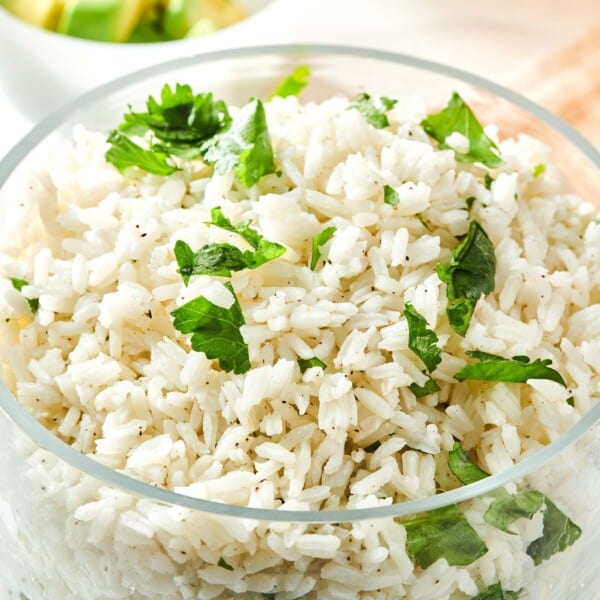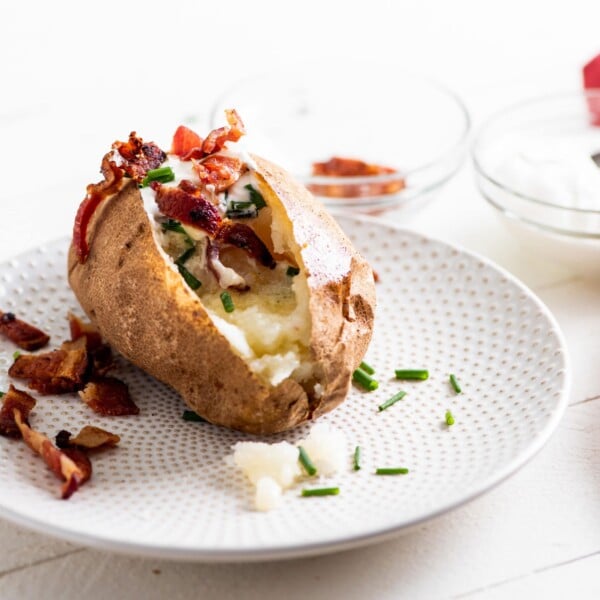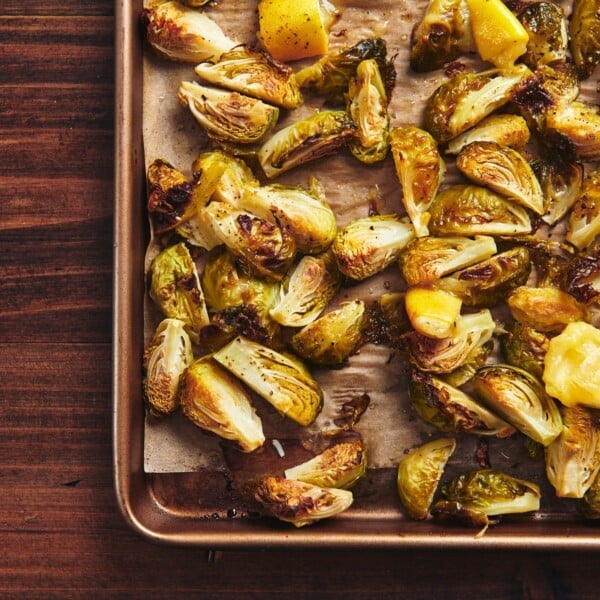How to Cook Ribeye Steaks on the Stove
on May 11, 2022, Updated May 21, 2025
This post may contain affiliate links. Please read our disclosure policy.
A foolproof method for perfectly cooked ribeyes every time.
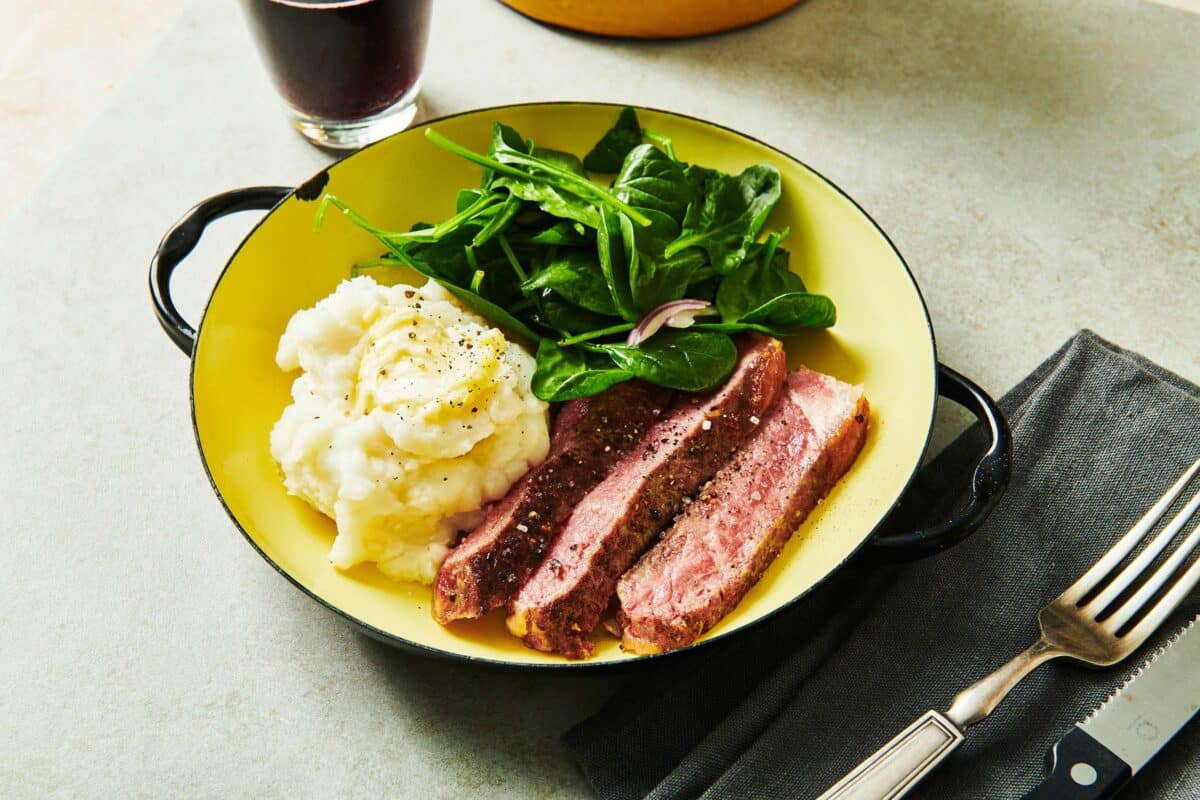
Pan-searing ribeye steaks on the stovetop offers up a wonderfully caramelized exterior and protecting the tender, flavorful pink meat inside. Cooking ribeye steak in a pan over direct high heat for a short amount of time is the best way to cook ribeyes indoors; it will allow you to get a great sear without overcooking the meat.
Ribeye steaks come from the eye of the rib, the section between the chuck and the loin. They might also be called Delmonico, Spencer, beauty steak, market steak, or Scotch filet.
By signing up, you agree to our Privacy Policy.
The ribeye cut has a lot of flavor and texture and takes well to sauces, as its ample level of beefy flavor can hold its own against other flavors. In this recipe, it is made with a simple garlic and rosemary butter pan sauce, and the taste of the beef comes shining through. Serve pan-seared ribeyes with Steakhouse Tomato Salad, Herb Mashed Potatoes, and maybe some Parmesan Broccoli for a complete steak dinner.
Also think about grilling those ribeyes in warmer weather!
What's In This Post?
- Bone-in vs. Boneless Ribeye
- How to Buy Ribeye Steaks
- Cooking Ribeye Steak in a Pan
- How Much Ribeye Steak Per Person?
- How to Cook Ribeye Steak on the Stove
- Cooking Times and Temperatures for Ribeye
- 6 Tips for Cooking a Perfect Steak
- Storage
- What to Serve With Ribeye Steaks
- More Steak Recipes
- How to Cook Ribeye Steaks on the Stove Recipe
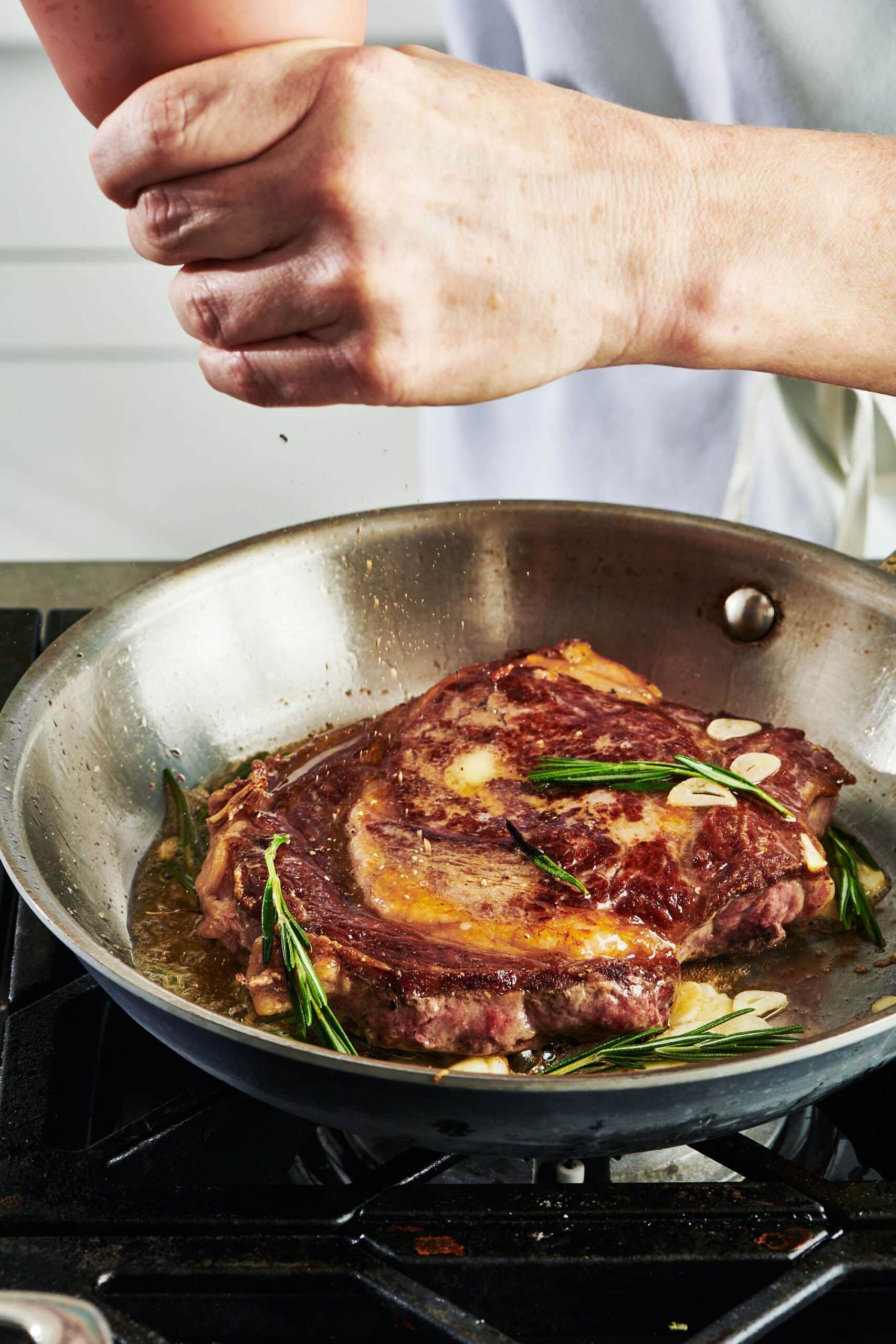
How to Cook Ribeye Steaks on the Stove: A foolproof method for perfectly cooked pan-seared steak every time.
Bone-in vs. Boneless Ribeye
This is a matter of preference. The ribeye steaks I‘ve been cooking lately have a small amount of bone still on the meat, but you can make any ribeye recipe with either bone-in or boneless ribeye steaks.
Cooking a bone-in steak in a pan sometimes results in slightly uneven cooking, as the meat might not lay equally flat in the pan. This may actually work out well, especially if you are making a ribeye steak for more than one person with different desired doneness. Some of the meat, usually the part closest to the bone, will end up rarer than the meat toward the outside of the steak. So, when you slice it, you’ll have a little range of doneness.
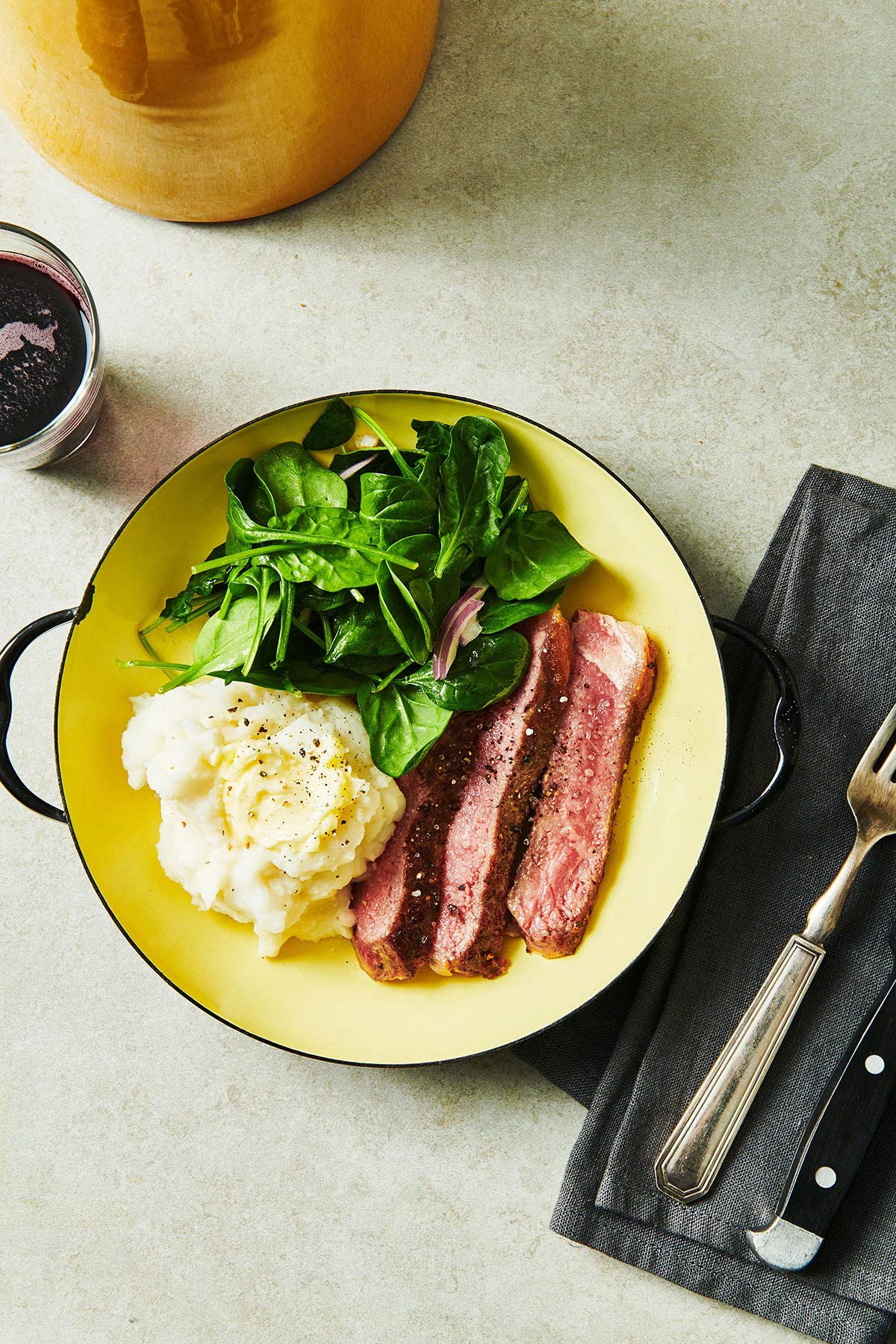
How to Buy Ribeye Steaks
As with all meat, the best place to shop is a good butcher. Other places, like Costco or other price clubs, have high-quality meat and high turnover, so you will get a consistent, reliable product there. There are now many online meat companies that sell sustainable and humanely raised meat, sometimes directly from the farm to the consumer.
If you are shopping at a supermarket, if your budget allows, try to find and purchase prime ribeye steaks. Choice is the next best option. If the supermarket has a butcher on site, ask if you can get steaks cut fresh.
Look for a nice amount of marbling, with white flecks and streaks of fat throughout the meat. The marbling allows the fat to melt into the steak as it cooks, giving it a tender, buttery texture and a whole lot of flavor.
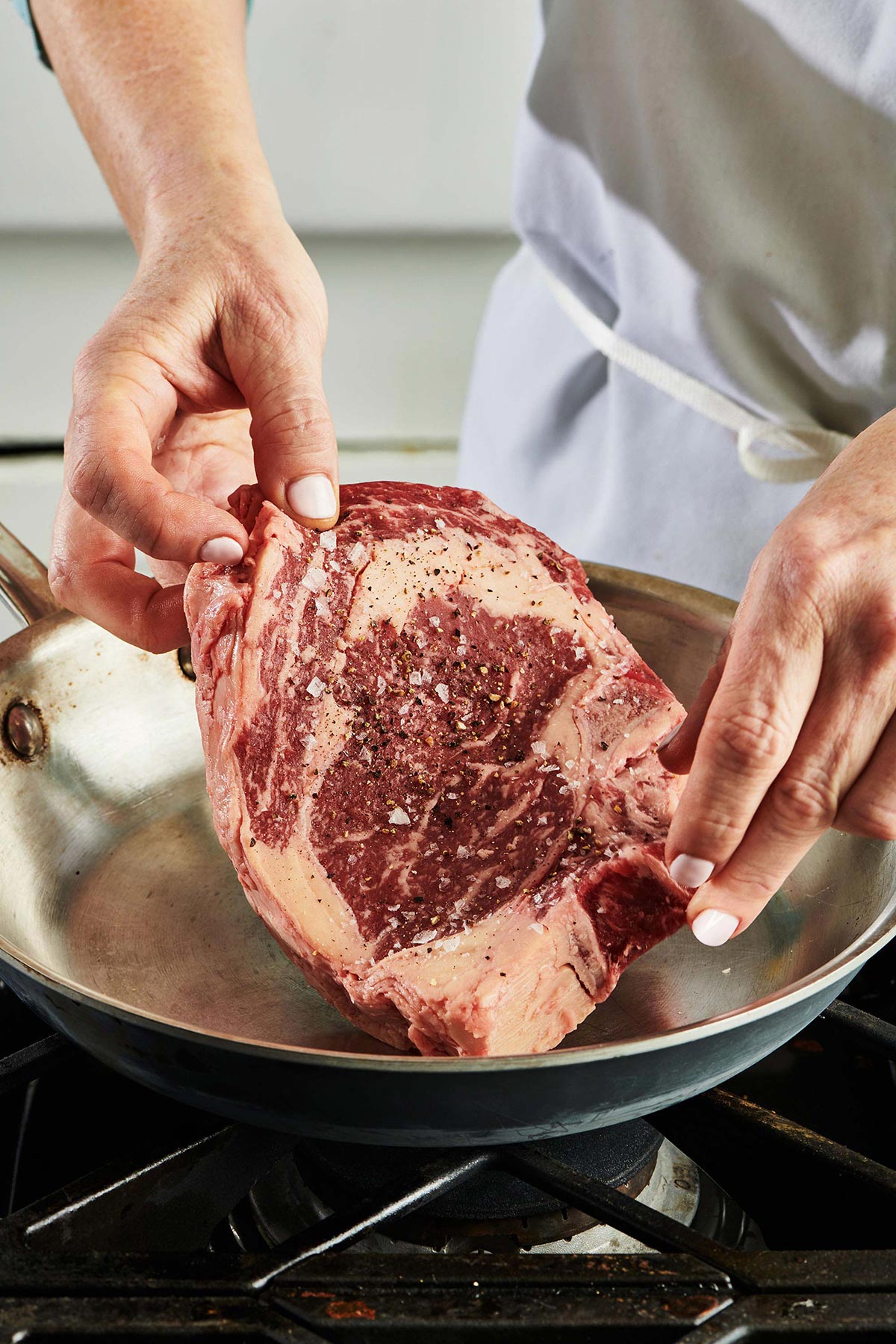
Cooking Ribeye Steak in a Pan
This recipe is for one 20-ounce or so steak, but if you have a bigger steak, you can gauge the timing and add 1 to 3 more minutes on each side. The thickness of the steak vs. the overall weight is the biggest factor in how long to cook it.
You can also cook multiple steaks this way in a pan, as long as your pan is large enough. You want to make sure there is room between each steak for optimal browning and even cooking. Use a heavy metal pan or a cast iron skillet for best results.
How Much Ribeye Steak Per Person?
You should plan on about 6 ounces of ribeye per person, more, of course, if you know you have devout steak lovers. And whenever you make a steak, plan for leftovers! A salad with sliced steak is a lunchtime treat, or you can use the meat, or of course, a sandwich on a crusty baguette with spicy mayo. Take into account the weight of the bones when determining the quantity of steaks to buy.
A ribeye steak often weighs about 20 ounces or more, and one steak will feed 2, 3, or more people. Once the cooked steak is nicely sliced and plated on a serving platter or individual plates, it will feel like a generous portion of meat.
How to Cook Ribeye Steak on the Stove
- Season the ribeye: Bring the steak to room temperature, about 20 minutes. Season the steak with salt and black pepper.
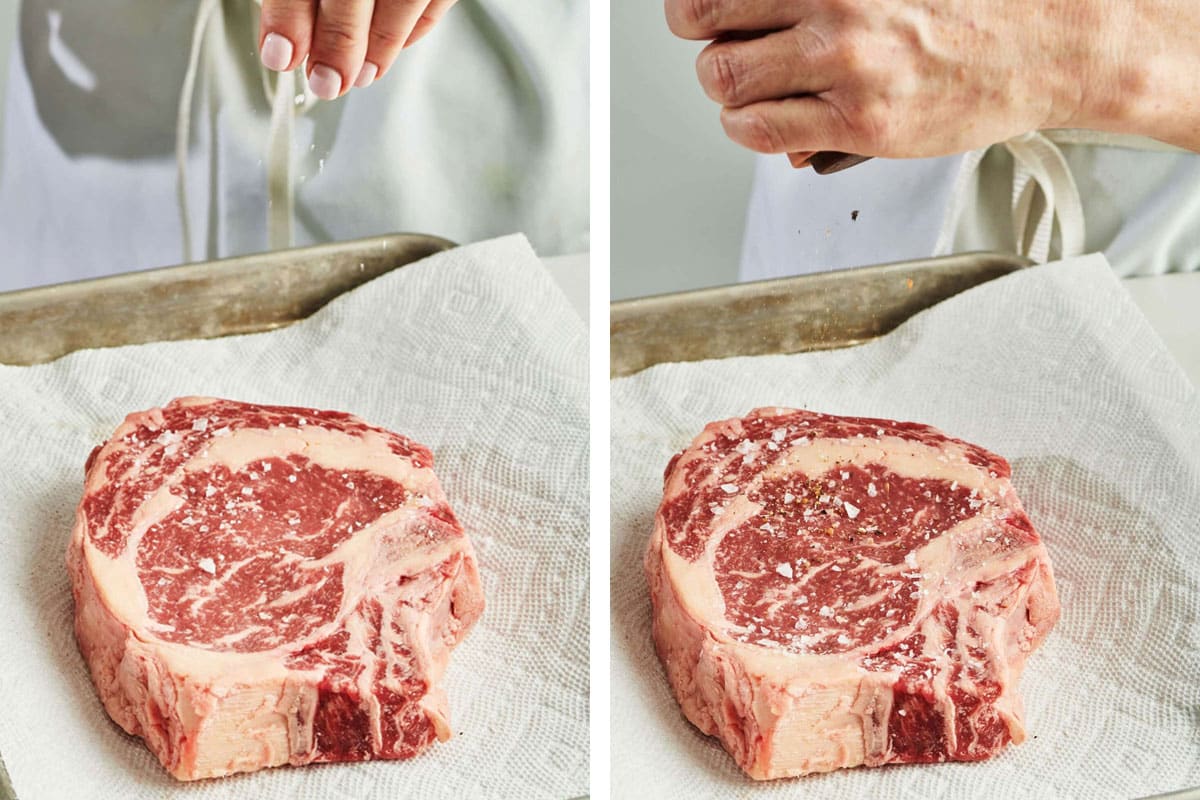
- Sear steak in hot oil: Heat a large, heavy skillet or cast iron pan over medium-high heat. When the pan is very hot, add the oil. Then add the steak and sear, without moving the steak, for 5 minutes until nicely browned on the bottom.
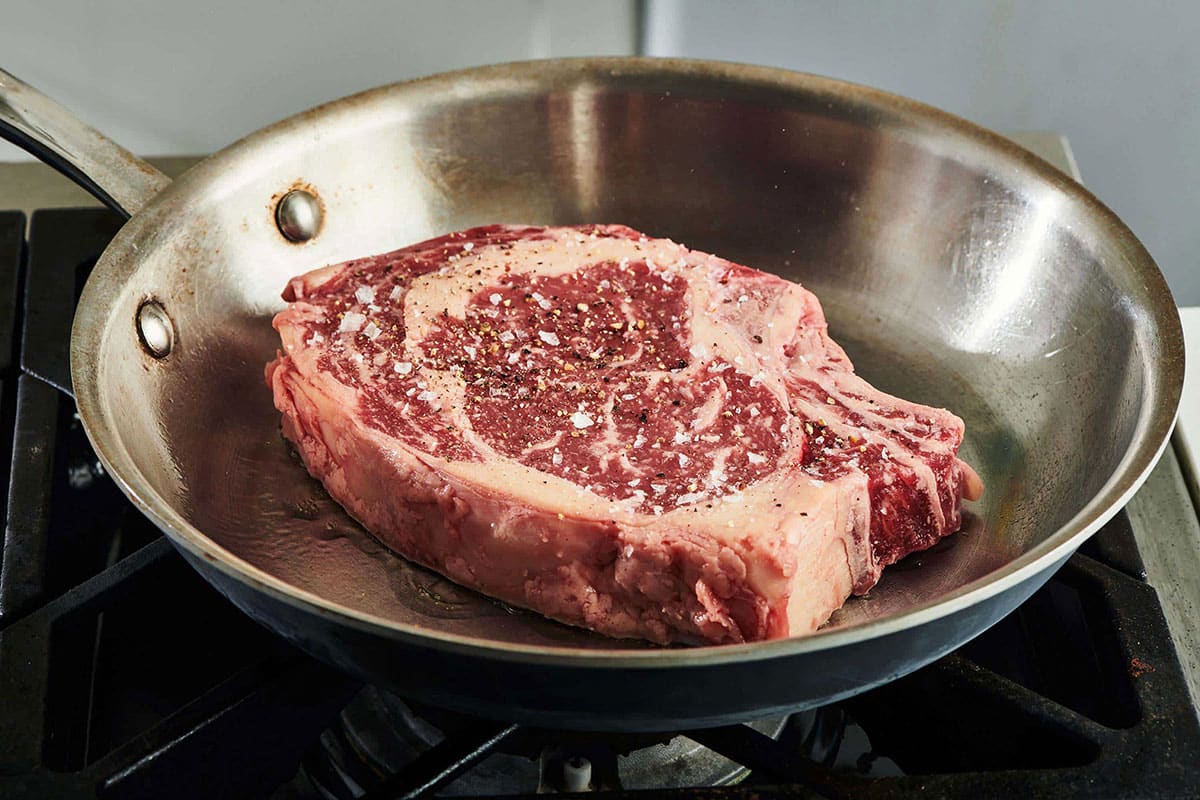
- Flip and add butter and herbs: Use tongs to flip the steak, and then add the butter to the top of the steak. Place the rosemary sprigs next to the steak in the pan.
- Finish cooking: Cook the meat for about another 4 to 5 minutes without moving the steak, allowing the butter to melt. Use a spoon to baste the top of the meat with the seasoned butter. For medium-rare, the middle of the steak should be 130 degrees F on a meat thermometer (see chart below for more cooking times).

- Rest the steak and sauté garlic: Remove the steak to a cutting board with a moat to catch the juices. Let the steak rest for 10 minutes before slicing. While the meat is resting, return the pan to medium heat and add the garlic. Sauté for 30 seconds, then remove the pan from the heat.
- Serve: Slice the steak across the grain. Arrange the slices on a plate and spoon the pan sauces in the skillet over the slices. Sprinkle with additional salt and freshly ground pepper.
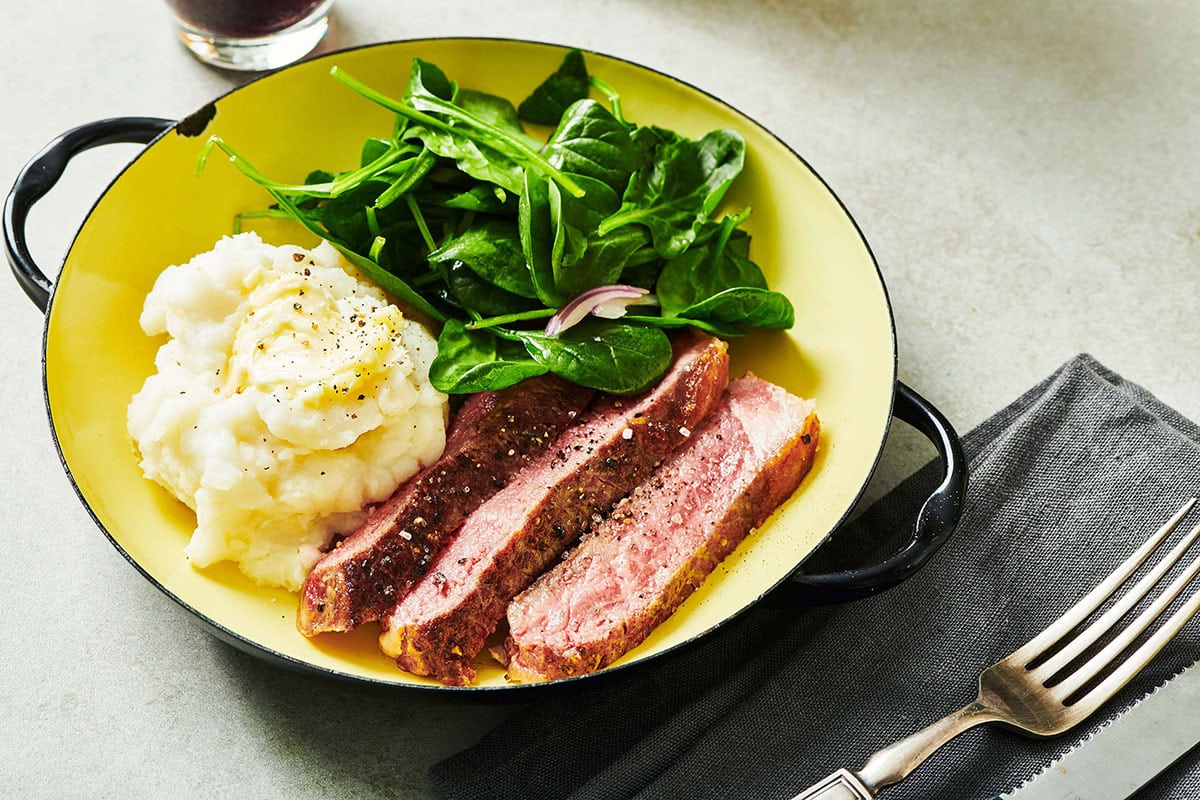
Cooking Times and Temperatures for Ribeye
These are approximate times for cooking ribeye steaks on the stove. The optimal doneness for ribeye is medium-rare, which allows its juicy flavor to be at its best. However, you should, of course, cook your steak to the doneness you like best!
| Thickness | Doneness | Pan Searing Time |
| 1/2 inch thick | Rare (125 F) | 1-2 minutes per side |
| 1/2 inch thick | Medium-rare (130 F) | 2-3 minutes per side |
| 1/2 inch thick | Medium (135 F) | 3-4 minutes per side |
| 1 inch thick | Rare (125 F) | 3-4 minutes per side |
| 1 inch thick | Medium-rare (130 F) | 4-6 minutes per side |
| 1 inch thick | Medium (135 F) | 6-8 minutes per side |
| 1 1/4 inches thick | Rare (125 F) | 4-5 minutes per side |
| 1 1/4 inches thick | Medium-rare (130 F) | 5-6 minutes per side |
| 1 1/4 inches thick | Medium (135 F) | 6-7 minutes per side |
| 1 1/2 inches thick | Rare (125 F) | 5-6 minutes per side |
| 1 1/2 inches thick | Medium-rare (130 F) | 6-8 minutes per side |
| 1 1/2 inches thick | Medium (135 F) | 8-9 minutes per side |
6 Tips for Cooking a Perfect Steak
1. Allow the Meat to Come to Room Temperature (or Not)
For most of my life, I’ve bought into the “rule” that it’s important to allow the meat to come to room temperature before cooking. The thinking is that otherwise, the inside will take significantly longer to warm up and cook, and by that time, the outside of the steak will be overcooked. I’m actually much more flexible about this now, and I think that steak expert Elizabeth Karmel’s theory that it’s ok to cook a steak right from the fridge is right. A thinner steak does better going from fridge to grill or pan or broiler, as the outside will have a chance to brown before the inside gets too well cooked.
2. Pat the Meat Dry
Pat the meat dry with paper towels to remove moisture before putting it in the pan. If the meat is wet, you won’t get a nice exterior crust.
3. Use an Oil with a High Smoking Point
You should use an oil with a high smoking point — like canola or vegetable — to pan-sear steaks on the stove. Butter or an oil with a lower smoking point, like olive oil, will start to burn at a lower temperature. And burnt fat will cause the steak to have a burnt taste, even if it is not overcooked itself. Butter is a lovely addition, but add it at the end and just allow it to melt in the hot pan, spooning it over the steak.
4. Turn on the Exhaust Fan!
This doesn’t affect the quality of the steak, but turn on the exhaust fan! The odds are that there will be a lot of smoke, so prepare by turning on the fan and opening windows and doors as you can. Thinking of this as a potential test to see if your batteries in the smoke alarm are still in working form.
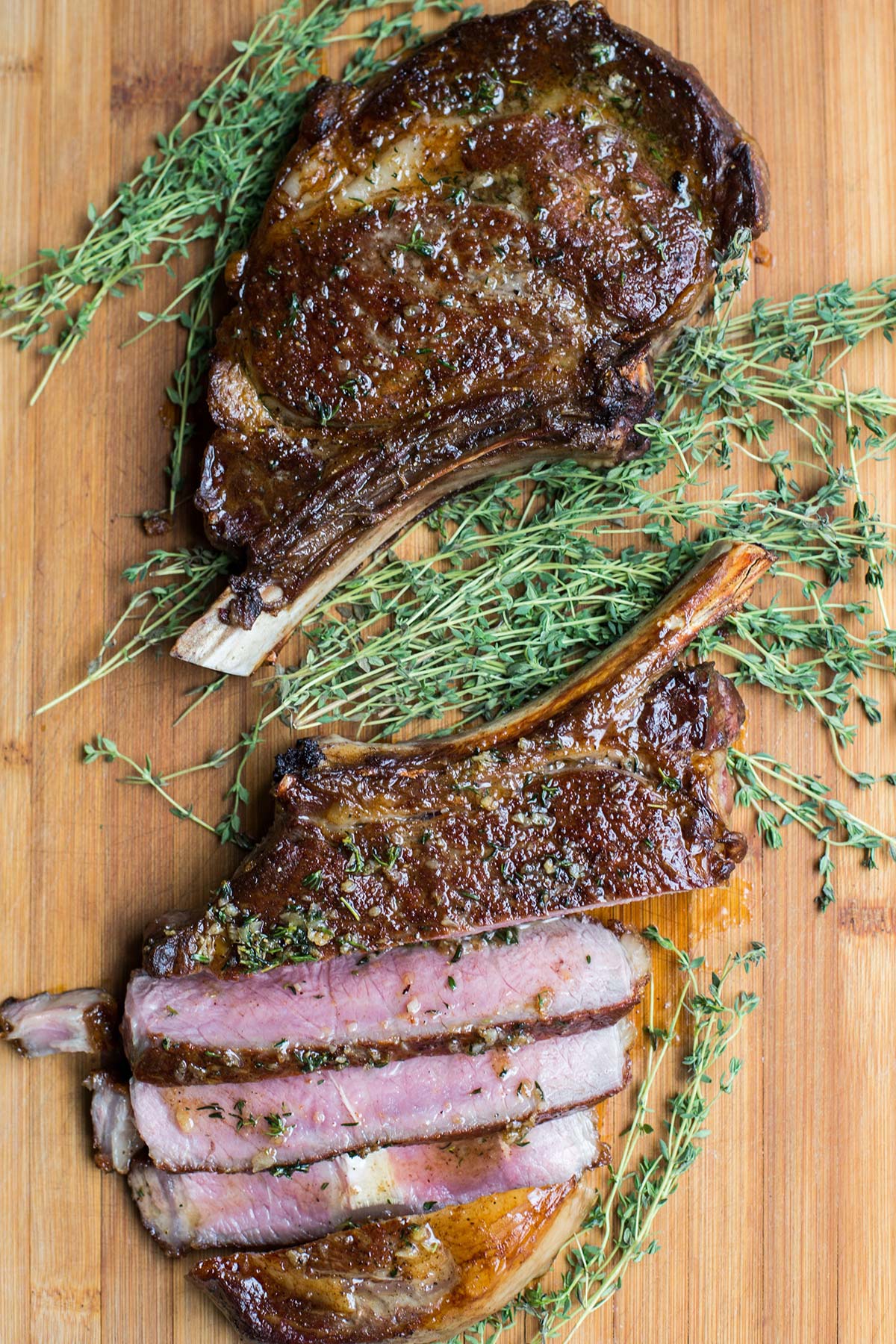
5. Let the Steak Rest
Even a steak on the thinner side needs to rest before you slice into it. This allows the beef to reclaim the juices that would otherwise pour out onto the cutting board. It might look like your steak is super juicy for a minute…and then you realize the juices are on the cutting board and not in your steak. Not good.
Letting the meat rest for at least 5 minutes means that the fibers can relax and reabsorb the juices. A very thick ribeye should rest for 5 to 10 minutes. Keep in mind that as the steak rests, the internal temperature will rise a bit, so take it from the heat just before it is cooked to your liking. It will continue to cook as it rests. Don’t worry that it will cool too fast; with the right timing, it will be perfectly cooked and warm throughout.
6. Slice Steaks Across the Grain
When you slice a piece of meat, you almost always want to cut across the grain to get the most tender and juicy eating experience. In his book Steak Lovers’ Cookbook, William Rice says, “…muscle fibers run along a piece of meat, not across it, creating what is called the grain. What we want to do is chew with (in the direction of) the grain.” This makes meat easier for us to chew.
Rice says that all you need to carve the meat properly across the grain (and carving a steak is easy!) is a sharp knife, a fork, and a cutting board with a moat that will contain the juice that escapes from the steak.
He advises when cutting the steak into slices for eating straight up that the slices be about at least 1/2 inch wide, which I think is the perfect thickness for slices of ribeye. If you are planning to use the sliced steak in something like a sandwich or a quesadilla, then you may choose to slice the steak more thinly.
Storage
Leftover ribeye is wonderful sliced and added to steak and cheese quesadillas, a Caesar salad, or a Greek salad. Store leftovers in an airtight container in the fridge for up to 5 days. If you want to reheat leftover steak, I recommend not slicing it before storing. You can warm it in the microwave and then slice it to prevent it from overcooking.
Variations
Try Ribeye Steak with Thyme and Garlic Butter for another herbal note.
What to Serve With Ribeye Steaks
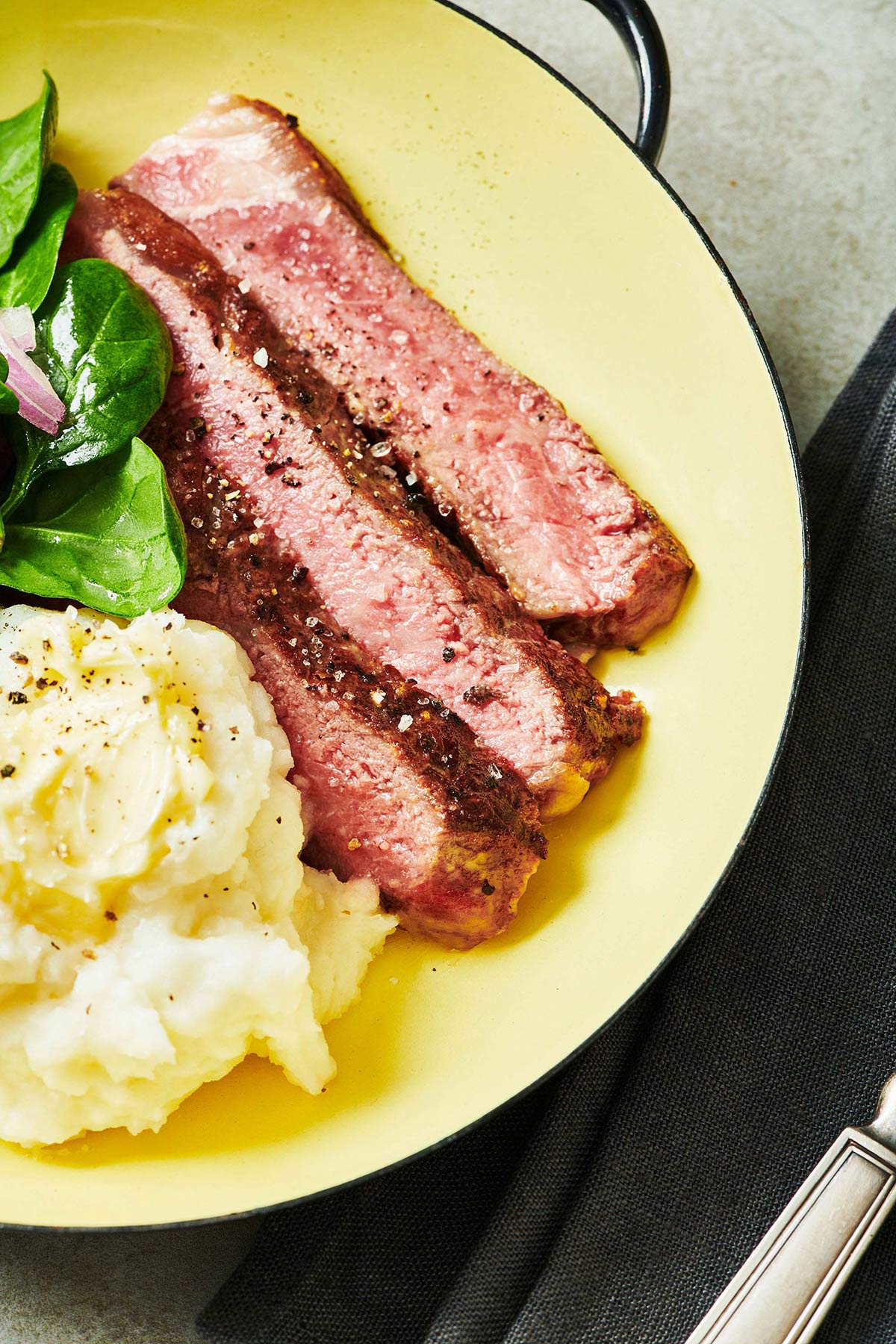
More Steak Recipes
- Grilled Mexican Ribeyes
- New York Strip Steak with Jalapeño Butter
- Skirt Steak Tacos
- Marinated Petite Filets
- Marinated and Grilled London Broil
Pin this now to find it later
Pin It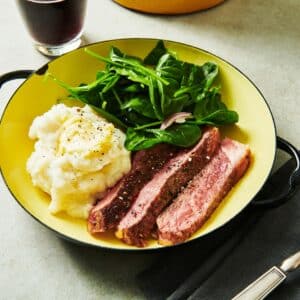
How to Cook Ribeye Steaks on the Stove
Ingredients
- 1 20-ounce (1 1/4-inch thick) bone-in ribeye steak
- Kosher salt and freshly ground black pepper (to taste)
- 1 tablespoon olive oil
- 1 tablespoon unsalted butter (at room temperature)
- 2 sprigs fresh rosemary
- 2 cloves thinly sliced garlic
Instructions
- Bring the steak to room temperature, about 20 minutes.
- Season the steak with salt and pepper. Heat a large, heavy skillet over medium-high heat. When the pan is very hot, add the oil then add the steak and sear, without moving the steak, for 5 minutes until nicely browned on the bottom.
- Use tongs to flip the steak, and then add the butter to the top of the steak. Place the rosemary sprigs and sliced garlic next to the steak in the pan. Cook the meat for about another 4 to 5 minutes without moving the steak, allowing the butter to melt and using a spoon to baste the top of the meat with the seasoned butter. For medium-rare, the middle of the steak should be 130 F on a meat thermometer.
- Remove the steak to a cutting board with a moat to catch the juices. Let the steak rest for 5 to 10 minutes before slicing.
- While the meat is resting, return the pan to medium heat and add the garlic. Sauté for 30 seconds then remove the pan from the heat.
- Slice the steak across the grain. Arrange the slices on a plate and spoon the pan sauces in the skillet over the slices. Sprinkle with additional salt and freshly ground pepper.
Notes
| Thickness | Doneness | Pan Searing Time |
| 1/2 inch thick | Rare (125 F) | 1-2 minutes per side |
| 1/2 inch thick | Medium-rare (130 F) | 2-3 minutes per side |
| 1/2 inch thick | Medium (135 F) | 3-4 minutes per side |
| 1 inch thick | Rare (125 F) | 3-4 minutes per side |
| 1 inch thick | Medium-rare (130 F) | 4-6 minutes per side |
| 1 inch thick | Medium (135 F) | 6-8 minutes per side |
| 1 1/4 inches thick | Rare (125 F) | 4-5 minutes per side |
| 1 1/4 inches thick | Medium-rare (130 F) | 5-6 minutes per side |
| 1 1/4 inches thick | Medium (135 F) | 6-7 minutes per side |
| 1 1/2 inches thick | Rare (125 F) | 5-6 minutes per side |
| 1 1/2 inches thick | Medium-rare (130 F) | 6-8 minutes per side |
| 1 1/2 inches thick | Medium (135 F) | 8-9 minutes per side |
